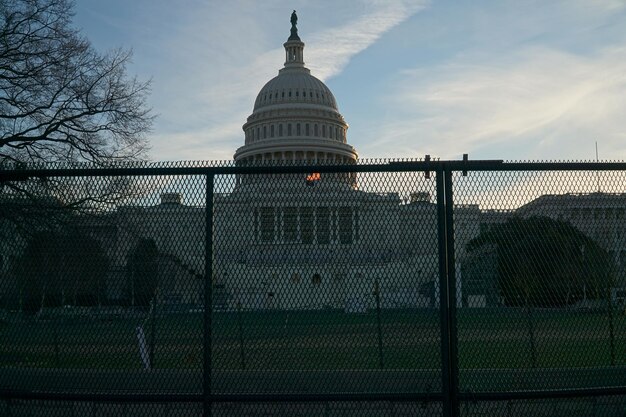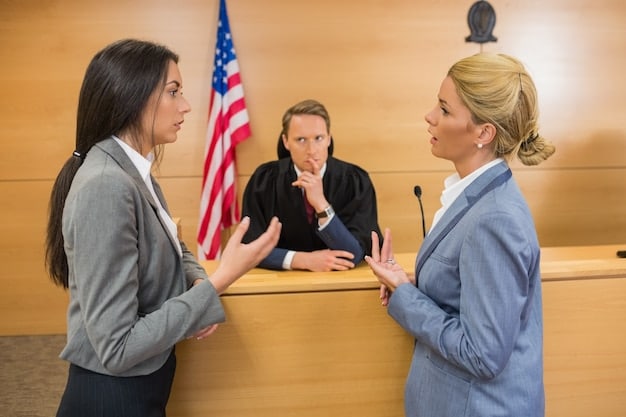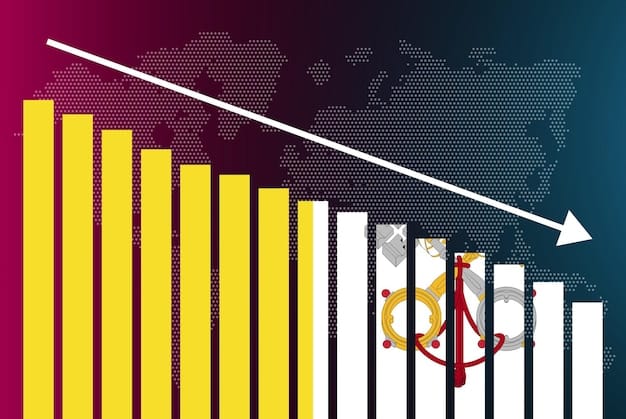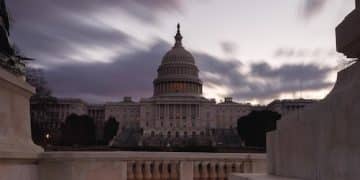Government Oversight: Can It Stop Political Corruption in the US?

Government oversight plays a crucial role in preventing political corruption by providing a system of checks and balances; however, its effectiveness in the US is constantly debated due to varying enforcement levels and political influence.
Is the system of government oversight: is it strong enough to prevent political corruption? This question is at the heart of every democracy, especially in the US, where the balance between power and accountability is constantly tested.
Understanding Government Oversight
Government oversight is the process by which legislative bodies, such as the US Congress, review and monitor the activities of the executive branch and other government agencies. It’s intended to ensure accountability and prevent abuse of power.
This system ideally acts as a safeguard, preventing corruption and ensuring that public funds are used efficiently and ethically.
The Role of Congressional Committees
Congressional committees are a cornerstone of government oversight. They conduct hearings, request documents, and issue reports to scrutinize government actions.
These committees play a vital role in holding government officials accountable for their decisions and actions.
- Investigative Powers: Committees have the power to subpoena witnesses and documents.
- Oversight Hearings: Hearings allow for public examination of government activities.
- Reporting: Committees publish reports detailing their findings and recommendations.

The effectiveness of government oversight often hinges on the willingness of these committees to conduct thorough and impartial investigations.
Ultimately, the goal is to maintain transparency and integrity in government operations.
The Mechanisms of Oversight
Government oversight involves various mechanisms designed to promote transparency and accountability. These mechanisms include audits, investigations, and inspections.
Each mechanism serves a unique purpose in ensuring that government operations are conducted ethically and efficiently.
Audits and Inspections
Audits and inspections are essential tools for monitoring government spending and performance. They provide an objective assessment of whether funds are being used appropriately.
Regular audits can help detect fraud, waste, and abuse, while inspections ensure compliance with regulations and standards.
- Financial Audits: Examine financial records to ensure accuracy and compliance.
- Performance Audits: Assess the efficiency and effectiveness of government programs.
- Regulatory Inspections: Verify compliance with laws and regulations.
These mechanisms are crucial for identifying and addressing issues before they escalate into major problems.
By providing regular assessments, audits and inspections contribute to a culture of accountability within government.
Challenges to Effective Oversight
Despite its importance, government oversight faces numerous challenges that can undermine its effectiveness. These challenges include political interference, resource constraints, and a lack of transparency.
Addressing these challenges is crucial for strengthening the oversight process and preventing corruption.
Political Polarization
Political polarization can significantly impede government oversight, as partisan divisions can hinder investigations and compromise objectivity.
When oversight becomes politicized, it can be used as a tool to attack political opponents rather than to genuinely seek accountability.
This can lead to gridlock and a failure to address serious issues of corruption and misconduct.
Overcoming political polarization requires a commitment to nonpartisanship and a focus on the public interest.
Resource Limitations
Adequate funding and staffing are essential for effective government oversight. Without sufficient resources, oversight bodies may struggle to conduct thorough investigations and effectively monitor government activities.
Resource limitations can also lead to a backlog of cases and a failure to address urgent issues in a timely manner

Investing in government oversight is crucial for ensuring accountability and preventing corruption.
By providing adequate resources, oversight bodies can better fulfill their mission and protect the public interest.
Historical Examples of Oversight Failures
Throughout history, there have been numerous instances where government oversight has failed to prevent or detect corruption. These failures often have significant consequences for both government and the public.
Examining these historical examples can provide valuable lessons for improving oversight processes.
Watergate Scandal
The Watergate scandal is a classic example of oversight failure. Despite initial attempts to cover up the scandal, investigative journalism and congressional hearings eventually exposed the truth.
The Watergate scandal highlighted the importance of an independent press and a vigilant Congress in holding government officials accountable.
- Cover-Up: Initial attempts to conceal the break-in at the Watergate Hotel.
- Investigative Journalism: The role of reporters in uncovering the truth.
- Congressional Hearings: The Senate Watergate Committee’s investigation.
Ultimately, the Watergate scandal led to the resignation of President Richard Nixon and significant reforms in government ethics and transparency.
It serves as a reminder of the potential consequences of unchecked power and the importance of robust oversight mechanisms.
Strengthening Government Oversight
To enhance the effectiveness of government oversight, several reforms are needed. These reforms include increasing transparency, strengthening whistleblower protections, and promoting nonpartisanship.
Implementing these reforms can help ensure that oversight bodies are able to fulfill their mission and prevent corruption.
Enhancing Transparency
Transparency is essential for effective government oversight. Making government records and proceedings more accessible to the public can help increase accountability and deter corruption.
Increased transparency allows for greater public scrutiny of government actions and decisions.
This increased scrutiny can help hold government officials accountable and prevent abuse of power.
Promoting transparency requires a commitment to openness and a willingness to share information with the public.
Protecting Whistleblowers
Whistleblowers play a critical role in exposing corruption and misconduct within government. Strengthening whistleblower protections can encourage more individuals to come forward with information.
Robust whistleblower protections ensure that individuals who report wrongdoing are protected from retaliation.
- Confidentiality: Protecting the identity of whistleblowers.
- Legal Recourse: Providing legal avenues for whistleblowers who face retaliation.
- Incentives: Offering rewards for reporting significant wrongdoing.
By protecting whistleblowers, government can create a culture of accountability and deter corruption.
This can help ensure that wrongdoing is exposed and addressed promptly
The Future of Government Oversight
The future of government oversight will likely be shaped by technological advancements and evolving public expectations. These factors could create both opportunities and challenges for oversight bodies.
Adapting to these changes will be crucial for maintaining effective oversight in the years to come.
The Role of Technology
Technology can play a significant role in enhancing government oversight. Data analytics and artificial intelligence can be used to detect patterns of fraud and corruption.
These technologies can help oversight bodies to identify and investigate potential wrongdoing more efficiently.
Technology can also be used to increase transparency and make government records more accessible to the public.
Embracing technology can help government oversight remain effective in the face of new challenges.
| Key Point | Brief Description |
|---|---|
| 🕵️ Congressional Committees | Monitor government activities through hearings and investigations. |
| 📊 Audits & Inspections | Assess financial records and operational efficiency. |
| 🏛️ Watergate Scandal | Exemplifies oversight failure, leading to reforms. |
| 🛡️ Whistleblower Protection | Encourages reporting of misconduct without fear of reprisal. |
Retractable FAQ Section
FAQ
▼
Government oversight involves legislative reviews of the executive branch, ensuring accountability and preventing abuse of power through audits and investigations.
▼
Government oversight is crucial for maintaining transparency, preventing corruption, and ensuring that public funds are used efficiently and ethically.
▼
Challenges include political polarization, resource limitations, and a lack of transparency, which can undermine the oversight process and its effectiveness.
▼
Strengthening government oversight involves increasing transparency, protecting whistleblowers, promoting nonpartisanship, and ensuring adequate funding and staffing.
▼
Technology, such as data analytics and AI, can enhance oversight by detecting fraud patterns, increasing transparency, and making government records more accessible.
Conclusion
In conclusion, while government oversight: is it strong enough to prevent political corruption? In this context, it faces numerous challenges but remains a vital component of US democracy, requiring ongoing reforms and adaptations to effectively safeguard against abuses of power and maintain public trust.





